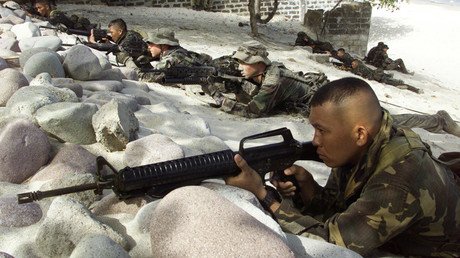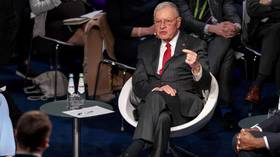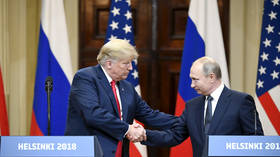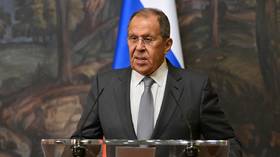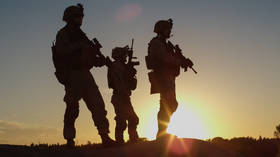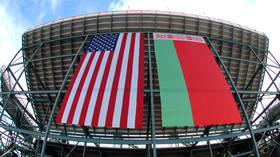Navies of US & Philippines conduct joint patrol (VIDEO)
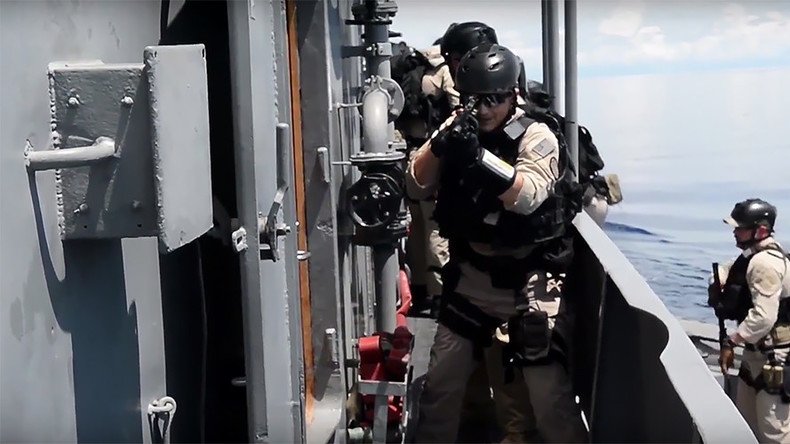
The navies of the US and the Philippines have jointly patrolled troubled waters in the southern Philippines amid rising fears that local Islamist cells may use maritime routes to spread reinforcements throughout the area.
The USS Coronado joined a Philippines Navy frigate, the Ramon Alcaraz, for a combined patrol in the Sulu Sea, which is separated from the disputed South China Sea by the Philippines’ archipelagic province of Palawan, according to a statement from the American embassy to Manila.
As part of the maritime operation, a group of Philippines sailors boarded the USS Coronado to improve communications and movements between the two ships.
“The Philippine sailors also exchanged best practices with their US counterparts in visit, board, search, and seizure (VBSS) techniques and information sharing,” the embassy statement said.
Before the joint patrol, the USS Coronado took part in joint naval drills in the vicinity of Cebu island to “sharpen tactical skills in maritime security operations that were employed during the coordinated patrol.”
“These patrols enhance regional peace and stability,” said Rear Admiral Don Gabrielson, commander of Task Force 73.
“Our at-sea operations with the Philippine Navy demonstrate our commitment to the alliance and deter piracy and illegal activities,” he added.
The naval patrols were conducted at the invitation of the Philippines government, the US embassy said, adding, “the US and the Philippines continue to work together on a number of initiatives and conduct regular military exchanges through routine participation in bilateral and multilateral exercises.”
Philippines leader Rodrigo Duterte said in October of 2016 that he was putting a halt to joint patrols with the US in the disputed South China Sea to avoid antagonizing China, which has laid territorial claims to part of the area.
He has also repeatedly said that the US military’s presence in the Philippines goes against the country’s interests, promising to reduce the number of bilateral drills.
The firebrand Philippines president has sought closer ties with both China and Russia, saying his nation is interested in purchasing arms and boosting military-to-military cooperation.
Manila never completely cut military ties to Washington, however. In January of this year, Philippines Defense Secretary Delfin Lorenzana said there will be no changes to the major US-Philippines military treaty, also known as Enhanced Defense Cooperation Agreement (EDCA).
“EDCA is still on,” Lorenzana said, as cited by Reuters.
The pact allows for the expansion of the rotational deployment of US warships, aircraft, and troops at five bases across the Philippines, as well as the storage of equipment for humanitarian and maritime security operations. Lorenzana added that President Duterte has promised to respect all existing agreements with the US.
While the Philippines is America’s closest and most long-standing ally in the Southeast Asian region, the strong ties between the two countries have been put to the test under President Rodrigo Duterte, who has forged an “independent foreign policy” that seeks to move the Philippines away from the US and closer to China and Russia.
The Philippines military is currently engaged in a lingering offensive on militants linked to Islamic State (IS, formerly ISIS/ISIL).
Concerns that the Islamists may cross from Malaysia and Indonesia to join Muslim rebels that earlier seized the city of Marawi in the southern Philippines have prompted the government to send troops to the area. About 300 militants, 82 Philippines troops, and 44 civilians have been killed in the fighting, Reuters reported.
